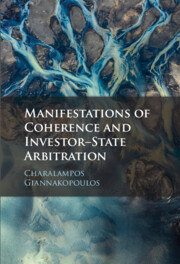Book contents
- Manifestations of Coherence and Investor–State Arbitration
- Manifestations of Coherence and Investor–State Arbitration
- Copyright page
- Contents
- Preface and Acknowledgements
- Table of Cases
- Table of International Conventions
- Table of International Investment Agreements
- Table of Procedural Rules
- Abbreviations
- Introduction
- 1 The Content of Coherence
- 2 Coherence and Legal Reasoning
- 3 Two Models for Coherence
- 4 Coherence and the Interpretation of Treaties
- 5 Coherence and Analogical Reasoning
- 6 Coherence as Reflexivity
- 7 Coherence as Moral Responsibility
- Coda
- Epilogue
- Bibliography
- Index
6 - Coherence as Reflexivity
Published online by Cambridge University Press: 13 December 2022
- Manifestations of Coherence and Investor–State Arbitration
- Manifestations of Coherence and Investor–State Arbitration
- Copyright page
- Contents
- Preface and Acknowledgements
- Table of Cases
- Table of International Conventions
- Table of International Investment Agreements
- Table of Procedural Rules
- Abbreviations
- Introduction
- 1 The Content of Coherence
- 2 Coherence and Legal Reasoning
- 3 Two Models for Coherence
- 4 Coherence and the Interpretation of Treaties
- 5 Coherence and Analogical Reasoning
- 6 Coherence as Reflexivity
- 7 Coherence as Moral Responsibility
- Coda
- Epilogue
- Bibliography
- Index
Summary
Chapter 6 unpacks the idea of reflexivity in judicial decision-making and its relationship with coherence. The chapter’s thesis is that coherence in legal reasoning and one’s commitment to reflexivity are intrinsically related notions. Reflexivity in adjudication is conducive towards coherence and, by extension, the degree of a decision-maker’s reflexivity can act as a useful indicator (though not a determinant) of the decision’s overall coherence. The chapter proceeds in two steps in particular. Firstly, it describes reflexivity as an overall desirable disposition for adjudicators to have. It identifies key components of reflexivity in practical decision-making, considers potential critiques, and ultimately establishes reflexivity as an indicator of coherence. Secondly, the chapter attempts to place the discussion in a practical context by way of a case study on the reflective thinking likely at play behind decisions addressing nationality planning activities by foreign investors. In so doing, the chapter also reviews instances where an arguably inadequate process of reflection may have negatively affected the overall coherence of an arbitral decision.
- Type
- Chapter
- Information
- Manifestations of Coherence and Investor-State Arbitration , pp. 207 - 251Publisher: Cambridge University PressPrint publication year: 2023



